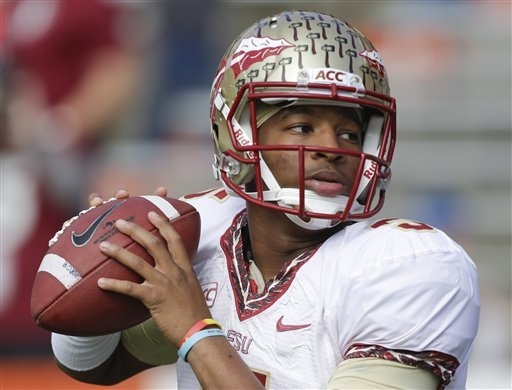Heisman winners must pass integrity test

By next week, the people who make sure the nation has a player worthy of the Heisman trophy — and the ESPN prime-time show devoted to it — will have their say.
And then we’ll know just what the definition of integrity means when it comes to handing out the little statue that means so much.
Look at the stats and the charisma of Jameis Winston, and it’s a no brainer. The redshirt freshman has led Florida State to an undefeated season so far, a No. 1 ranking and almost surely a berth in the BCS title game.
Look at the allegations of a woman who claims the star quarterback raped her, and it’s another story. Look at how authorities in Tallahassee have handled it so far, and it’s distasteful at best.
Innocent until proven guilty? A grand concept, and for that, we should be grateful we have the judicial system to give us the final say.
But this isn’t about a courtroom trial or being judged by a jury of peers. This has nothing to do with the possibility Winston could face prison instead of the NFL.
This is about voting for the Heisman, and this is about a good time to say no.
No to the notion that athletes should be exalted without question. No to a football culture that the woman’s family members said was so pervasive that detectives warned against pressing ahead with charges.
No to those who say that the only thing that matters is how many games you win and how many alumni can brag they got tickets to the BCS title game.
“If this was an issue like he stole a stereo or something, I might look at it differently,” said Richard Lapchick, the activist and renowned arbiter of ethics in sports today. “But to turn a blind eye to this would be a mistake.”
It would because the Heisman is more than just an end-of-the-season award. It’s a trophy that has almost achieved a mythical status, and it comes with the provision that the player not only must be very skilled but possess a certain amount of integrity.
We know where Winston fits in the first requirement. He’s completed two of every three passes, thrown for 35 touchdowns and led the Seminoles to within one game of the title game in Pasadena.
But no one outside of Winston and his accuser can be sure how he rates on the second.
Unfortunately, the wheels of justice sometimes move slowly. That seems to be even truer in Tallahassee, where the family of the woman claims police never presented a case to prosecutors from when it was reported in December until it was reported about last month.
When test confirmed Winston’s DNA was found in the underwear of the accuser, Winston’s attorney said the sex was consensual.
The family members have not changed their stance once.
“To be clear, the victim did not consent,” the family said in a statement. “This was a rape.”
Winston, as is his right, has said nothing, either to police or reporters. And as the clock ticks toward Monday’s balloting deadline for the Heisman, prosecutors say they haven’t decided yet what to do and will not rush their decision just to have it done by the vote.
So Heisman voters are left with a dilemma. Do they go ahead and award the trophy to the best man on the field, knowing that there’s a possibility he could be charged with rape? Or do they take into account the mission statement for the Heisman, which says the award should go to “the outstanding college football player whose performance best exhibits the pursuit of excellence with integrity.”
So far, the vote seems to be solidly on Winston’s side. Websites that track the leanings of the 928 voters have him winning in a landslide. A small survey by The Associated Press last week showed 27 of 33 voters would consider Winston even if prosecutors had yet to determine whether to charge him by the time the ballots were due.
Their argument is he’s yet to be charged with anything and to deny him college football’s top award would be unfair if he is indeed innocent. But another argument could be made that he shouldn’t have even been playing this season if Florida State was aware that the woman identified him as far back as January as her attacker.
It’s not just a football issue, either. A 2007 Department of Justice study showed one in seven coeds reported being victims of completed sexual assaults at some point in their college lives. Most happened while they were incapacitated by alcohol or drugs, and only a small percentage were ever officially reported.
“It’s such a huge issue to honor somebody with that cloud over them,” said Lapchick, who heads The Institute for Diversity and Ethics in Sport at the University of Central Florida. “For that reason, it has to be considered.”
It does, and it should. Sadly, there’s an awfully good chance it won’t.
Is Jameis Winston the best college player in the country? Yes, he is, and there’s a good chance he will be again next year if circumstances allow.
But he’s not Heisman winning material right now. At least not until a far bigger question is answered first.
Tim Dahlberg is a Las Vegas-based sports columnist for The Associated Press. Write to him at tdahlberg@ap.org or twitter.com/timdahlberg.












